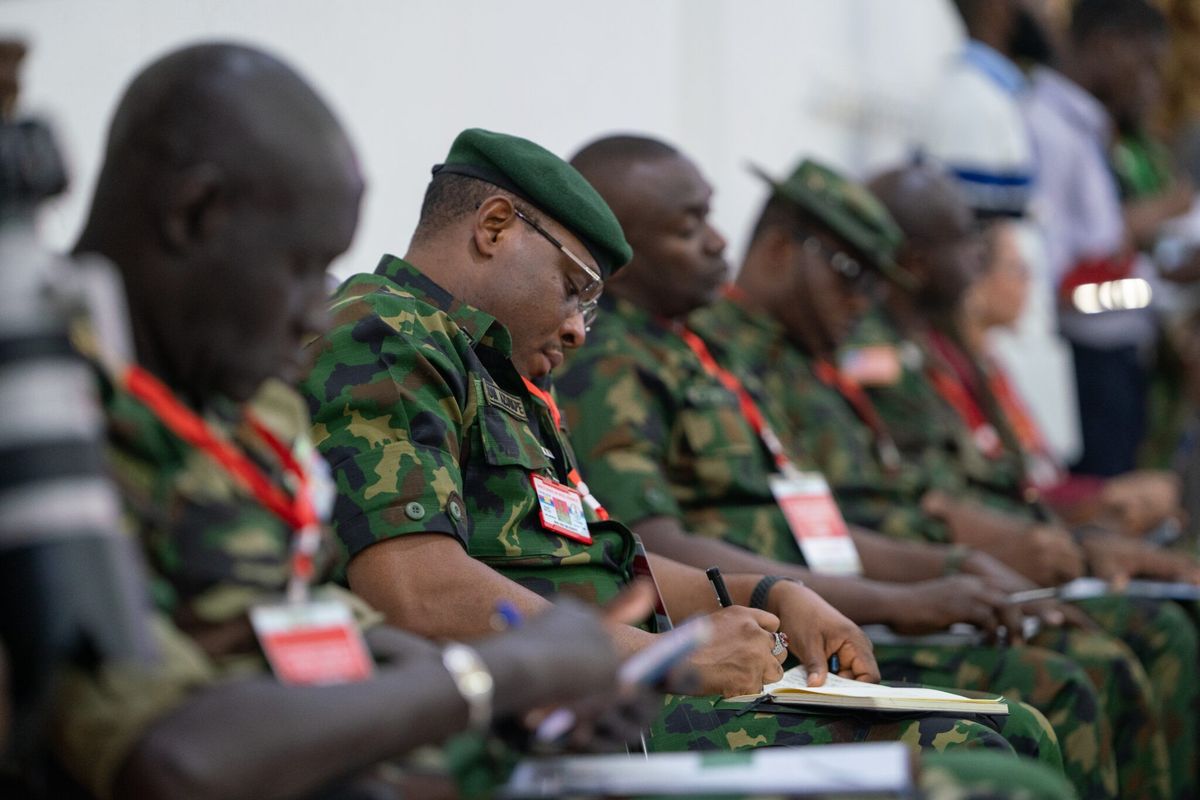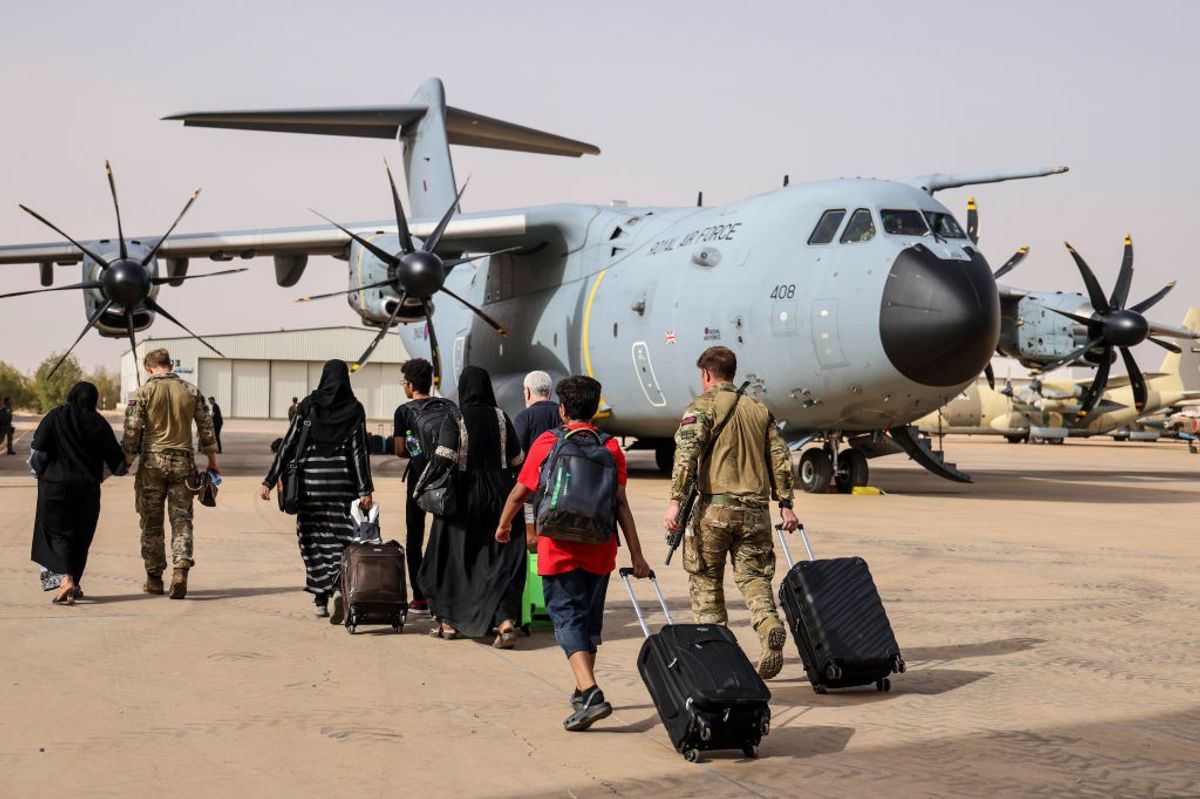Gerry Northwood OBE is applying his experience as a Captain in the Royal Navy to his new role as the Chief Operating Officer of Maritime Asset Security & Training Ltd to ensure his client’s safety when operating in the maritime realm. Northwood told The Cipher Brief that private companies, like his, fill in the gaps where governments simply do not have the resources or personnel to ensure complete safety in international and territorial waters. He discussed the challenges his clients face in the Gulf of Guinea.
The Cipher Brief: Help our readers better understand the piracy threat in the Gulf of Guinea.
Gerry Northwood: There are really three types of piracy we are seeing in the Gulf of Guinea. First, there is product theft—theft of refined petroleum from tankers, where the whole ship is kidnapped giving access to the cargo, and then that cargo is sold on the black market. The second type is kidnap and ransom, where a vessel is boarded, members of the crew are taken into the Delta Region, and they are kept and held there for ransom payment. It is not necessarily one nationality more than another—it can be Europeans, Americans, or Asians, for example. The third type is maritime mugging, where a vessel is boarded to steal computers, laptops, phones, and anything else they can get their hands on that is valuable.
Product theft comes and goes. There have been hijacks of vessels, mostly within Nigerian territorial waters or economic zone. They have actually hijacked vessels at Gabon at one end and Ivory Coast at the other, but it’s all Nigerian crime. The change in crime levels relies on whether the Nigerian government is ready and able to crack down on it using the Nigerian Navy. When you see the Nigerian Navy cracking down, as they have been recently, then the product theft tends to go away for a while, but it comes and goes.
Kidnap and ransom is very mixed up in the politics of the Delta Region. The prediction at the moment is that, given what is going on with the new Nigerian government and the amount of poverty and pollution from the oil companies within the Delta Region, we’re going to see more kidnap and ransom. Kidnap and ransom didn’t even happen in Nigeria until the early 2000s, and now it’s actually quite prevalent. It’s not connected to Boko Haram or anything like that at the moment; it’s straightforward business deals where people are being kidnapped for money, and not just people at sea, but on land as well.
Regarding who the vulnerable targets are, it is difficult to say because anyone is just as vulnerable as the next. I don’t really know how the criminals make their selection. In the maritime environment, if they decide they’re going after a vessel, they go at it hard, they’re well armed, they’re well equipped, and it takes a lot to stop them.
TCB: How does the security threat in the Gulf of Guinea compare to other areas such as the Gulf of Aden? Why is the international community more involved in the Gulf of Aden?
GN: They are two completely different areas, and the geopolitics of the two are completely different. With the Gulf of Aden, ships are passing through international waters, so international customary law and UN Convention law apply. Putting armed guards on board vessels in international waters isn’t really a problem. The jurisdiction of the armed guards is operating under the flag state of the vessel in which they’re embarked. As soon as you go inside territorial waters—inside the waters of another state—then you have to abide by the laws of that state. For instance, the U.S. Government would not tolerate having armed guards on a merchant vessel operating inside their territorial waters.
In the Gulf of Aden, you don’t have to worry about that because you are staying inside international waters. The jurisdiction there is a clean and relatively simple process. Once you start operating in the Gulf of Guinea, you are probably going to a port in the Gulf of Guinea. If you are going through the Gulf of Guinea and remaining in international waters, it is not terribly complicated. In fact, if you stay far off offshore, you are not at risk anyway, because the threat really becomes apparent when you approach territorial waters, particularly those of Nigeria. The closer you get to land, the more likely you are to be successfully targeted by the maritime criminals, by pirates, because they are operating from the land. As you come into a country’s territorial waters, you have to conform to the laws of that state.
Nigeria, for example, closely protects its sovereignty on the use of force, which is exercised through the Nigerian Navy. If you want to take your vessel into Nigerian waters and you want security, you have to ask for a Nigerian patrol boat with Nigerian Navy personnel on board or for Nigerian Naval personnel to embark on your vessel. This presents a completely different problem in terms of the legal jurisdiction or management of weapons, because it is difficult to conduct due diligence on the capability of the guards or the vessel.
TCB: It seems like international law as it relates to maritime security is underdeveloped. How does this affect private security companies like yours?
GN: Keeping with the Nigerian scenario, the Nigerians have a Memorandum of Understanding (MoU), which is a licensing agreement between the Nigerian government and a private security company. The MoU mandates that the security company can provide security to vessels, but it has to exercise a relationship with the Nigerian Navy when bringing guards into play. In other words, you can only provide an armed guarding service in Nigeria if you have an agreement with the government, and that agreement will mandate that you employ Nigerian Navy guards.
What we used to do is have a UK unarmed security advisor aboard the vessel to supervise the standard of guarding, provide assistance to the master, and ensure that the Nigerian Navy guards did the job that is required. The Nigerians have since made it very difficult for any vessel coming into port with unarmed security advisors onboard, even if they are listed in the crew manifest or the passenger manifest as something other than being guards. Earlier this year, vessels were arrested because they had unarmed security advisors on board, who were not Nigerians.
Since then, at MAST (Maritime Asset Security & Training), we have not done any work using UK unarmed security advisors in vessels going to Nigeria, because we don’t want to put our client’s vessel at risk of being impounded due to breaking Nigerian law and regulations. This is very difficult for us, because we do have relationships with companies operating in this area and clients who are in different parts of the world, who would like to expand into the Gulf of Guinea region. We are examining, at the moment, how we can best go about that.
TCB: You have written that maritime security requires a multi-agency approach, and one that has an important role for the private sector. What services does MAST Security provide, and how can private security work with local governments to improve the security situation?
GN: We provide armed security and immunization, we provide security oversight in West Africa, and we have been involved in the training of Coast Guards, specifically the Omani Maritime Police and Coast Guard, in boarding and search techniques, which includes the collection of evidence and preservation of the crime scene. So we’ve done a variety of different types of things.
Regarding the second part of your question, what was apparent in the Indian Ocean was that the governments and military forces were unable to provide sufficient security to protect vessels from the Somali pirates. What they did was good work that provided a strategic template for greater security in the region and definitely made it more difficult for the Somalis to operate, but only to a point. It was only when the Somali pirates were confronted with an armed guard on the vessel they were attacking, were they effectively deterred from pressing home the attack. Once there were sufficient armed guards in place, the Indian Ocean became a safe region for vessels to operate, and actually, you can argue that it is the safest ocean in the world, at the moment, for commercial shipping. It is akin to locking up your building at night and having sufficient locks on the doors and windows to deter local burglars from coming to your building. The night you leave it open, there will be people stealing from you. The same thing goes for a ship. It is a high value asset, and from 2008 to 2012 the Somalis spotted that the doors were being left open.
What you also see in the Indian Ocean is recognition by Western governments that they couldn’t provide all the necessary security. They needed some interaction from the private sector. Similarly, looking at other places in the region like Somalia, if you want to train the local Coast Guards, Navy, and forces of law and order—from judges all the way down to lawyers and police—you have to have the ability to achieve the levels of good governance that we take for granted in the West. Governments in parts of Africa, Asia, and the Middle East need help to do that. Many don’t have the resources, and even governments with wealth and resources don’t necessarily have people with the right experience, education, and training to be able to do that for a long period of time. That is where there is room for private-public partnerships, because the private sector has the agility to turn a contract around very quickly, develop the training program, and put the right people on the ground.
TCB: Are there any additional challenges that make it difficult to achieve maritime security in the Gulf of Guinea?
GN: It is really complex, because you have several nations there with their own territorial waters and their own ways to manage them. The Nigerians certainly take a very bullish view of what is permitted inside their economic zone and territorial waters. You also have an incredibly close, almost symbiotic, relationship between the government and people we would regard as criminals. It is Nigeria, it is different, it is not the West. So, what we call corruption, and it is corruption by any name, runs deep throughout Nigerian society.
They are trying to change things. Interestingly enough, President Buhari, at the moment, appears to be making clear overtures to international companies and businesses about what they must do to clean up their act; i.e. as businesses dealing with Nigeria, do not deal with corrupt practices, do not allow yourself to be drawn into the corruptness. This does not attack the corruption directly but attacks it through the companies that deal with Nigeria. That is a very Nigerian approach, in a way, but it is so ingrained within their economy—companies may pay thousands just to operate—that you cannot break it by saying, “behave yourselves.”
The corruption problem in Nigeria is something that the new government is making lots of good noises about how to deal with it, but it is so complex that they will only ever be able to deal with it in part. In 20-30 years time, we may be looking back on a completely different Nigeria, but nothing is going to change any time soon.













